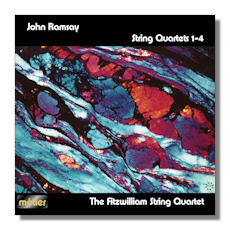
The Internet's Premier Classical Music Source
Related Links
- Ramsay Reviews
- Latest Reviews
- More Reviews
-
By Composer
-
Collections
DVD & Blu-ray
Books
Concert Reviews
Articles/Interviews
Software
Audio
Search Amazon
Recommended Links
Site News
 CD Review
CD Review
John Ramsay

String Quartets
- Quartet for Strings #1 in D minor
- Quartet for Strings #2 in E minor "Shackleton"
- Quartet for Strings #3 in C major
- Quartet for Strings #4 "Charles Darwin"
Fitzwilliam String Quartet
Metier MSV28528 2CDs 87min
Born in London on 17th June 1931, John Ramsay is one of today's most active British composers, if only for the teaching expertise that he continually imparts. He started playing the cello at the age of 18, and when his compulsory military service was carried out, he spent two years in the band of the Corps of Royal Engineers, where he became principal cellist and tenor drummer. When these engagements were terminated, he was appointed Professor at the Imperial College, the Leeds University and the University of Zürich. He was one of the mainstays of the London University Orchestra, and also deputy leader of the "cello" section of the Fairfax Orchestra based in London. After his retirement he joined a group of teachers to organize chamber music courses at Cratoule, France. As a composer, he has several chamber and orchestral works to his name. His leanings are mostly towards the tonal style, but serial methods do feature in his works from time to time.
This set focuses on the four string quartets that Ramsay composed between 2000 and 2009. The first is dedicated to Steven Ayrton, the composer's best friend, and with its Bartókian rhythms and Gaelic sounds it makes challenging listening.
The Shackleton Quartet (No. 2) was written in remembrance of Robert Milner Shackleton, a personal friend and former colleague of the composer, and also a distant relative of the famous Arctic explorer. The piece is almost entirely a funeral oration, and it is only at the end that Ramsay livens things up by introducing the rhythmic bounce of a traditional flamenco dance.
The Third Quartet dedicated to the Galitzin String Quartet has a first movement imbued with Mozart's spirit, but the rest of the work is permeated by a strong dissonant language punctuated by certain harmonic and rhythmic extremes that create a sense of conflict.
Commissioned by the organizers of the Cambridge Darwin Festival 2009 celebrating the 200th anniversary of the scientist's birth, and dedicated to the Fitzwilliam String Quartet, the Fourth Quartet is essentially tonal; an attempt by the composer to create a sound world very much akin to that of Darwin's times. In one continuous movement, the programme falls into three parts: the evolution of the Earth; the development of life and Man, and finally, a speculation on the future development of the planet and mankind.
This is generally meaty stuff that the Fitzwilliam Quartet take in their stride with convincing vigour, and their utter dedication to the music serves the composer's cause to a maximum. Stimulating, but still, approach with caution.
Copyright © 2012 by Gerald Fenech.





















